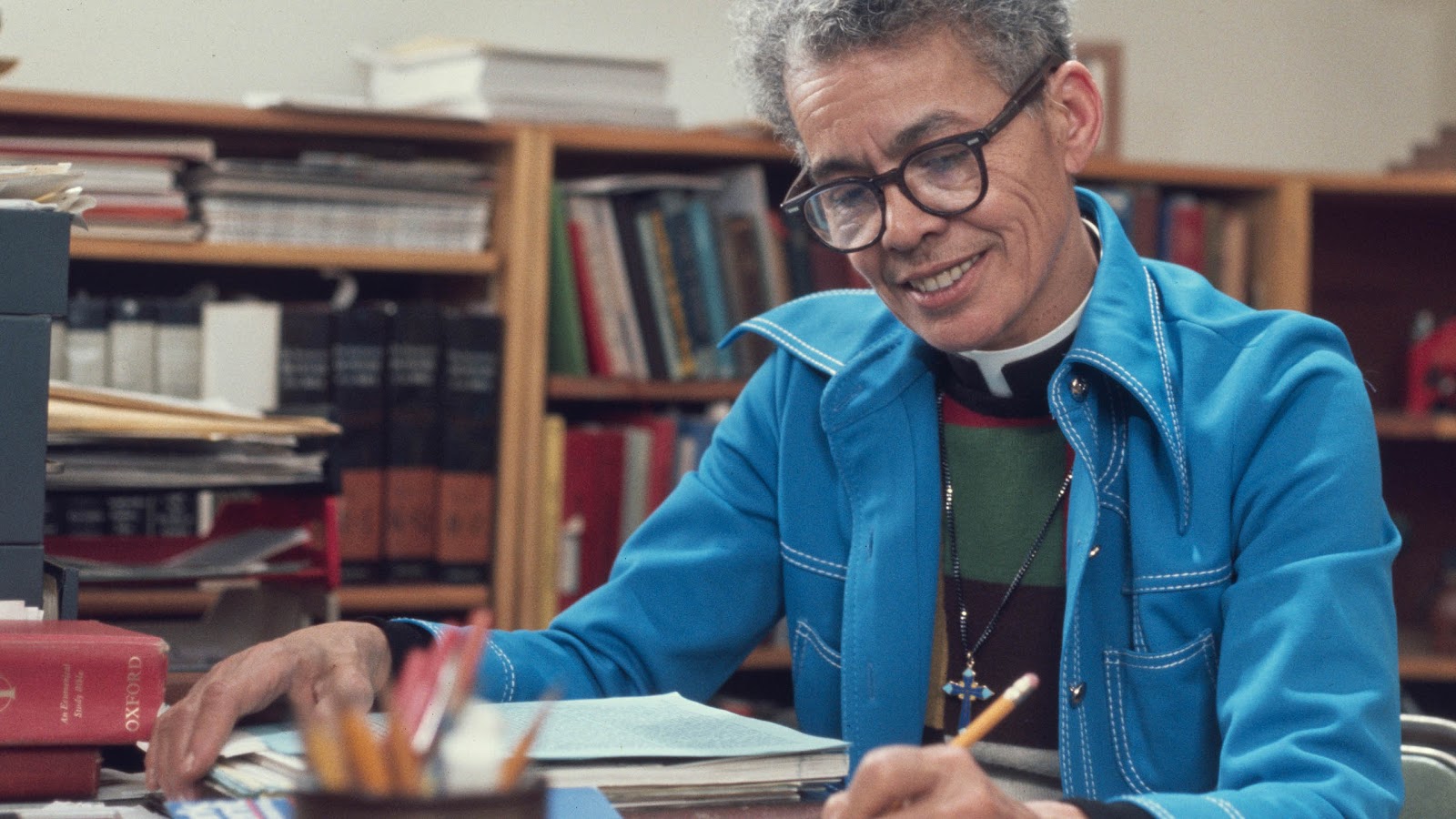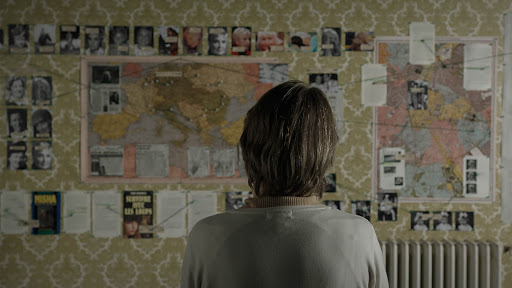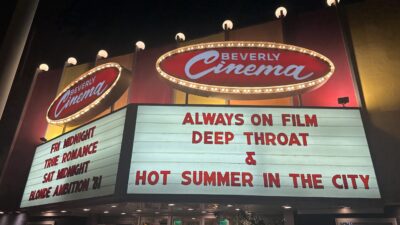Merry-Go-Round Magazine is covering the 2021 Sundance Film Festival!
We’re reaching the tail-end of the festival, but no fret, we have tons more coverage to come. The sales announcements have been soft and slow, but here’s hoping we can do our part to keep elevating projects that shouldn’t be lost in the ether of “content.” Without any further ado, here’s a documentary round-up from the fest: Mariem Pérez Riera’s soaring tribute in RITA MORENO: JUST A GIRL WHO DECIDED TO GO FOR IT, the revealing, yet ethically dubious CUSP, Julie Cohen and Betsy West’s follow-up to their RBG documentary, MY NAME IS PAULI MURRAY, and recent Netflix acquisition MISHA AND THE WOLVES.

RITA MORENO: JUST A GIRL WHO DECIDED TO GO FOR IT
Director: Mariem Pérez Riera
When I was a sophomore in college, I sang a solo at a large-scale fundraiser to raise money for the school of performing arts, with all The Who’s Who of Orange County and Los Angeles performing arts in attendance, including the evening’s legacy awardee, Rita Moreno. I nervously searched around the room hoping for even just a glance of her—and I found her on the dance floor, doing the cha-cha like nobody was watching. Before I could approach her to say how huge a fan I was, her eyes widened as a smile spread across her face. She exclaimed, “You’ve got some pipes, girl! Great job!” and just went back to dancing. I will always remember that moment, and in watching RITA MORENO: JUST A GIRL WHO DECIDED TO GO FOR IT, it was like reliving that moment all over again. That life, that passion, and that ball of energy you see on screen is exactly who she is, without any façade. I grew up in awe of Rita Moreno. WEST SIDE STORY is still a movie I revisit every single year, and I always light up when Anita appears, standing firm in her convictions and doing it with the sass and style of a strong, three-dimensional woman who doesn’t take shit from anyone. To see that Anita is not far from the woman Rita is in real life was a welcome realization. For all the years I have looked up to Rita, I realize I only knew a tiny sliver of her story. This woman has endured so many unspeakable hardships that it makes it all the more incredible when you see her positive and chipper disposition today.
What this documentary does exceptionally well is walk through her life and career in a way that doesn’t feel like she is only reduced to the roles she played on screen, the way that films about other Hollywood starlets tend to do. Instead, it lets her tell her own story, in her own words and with her own signature wise cracks, with vulnerability, heart, and passion. She is as three-dimensional in the documentary as the roles she chose to play. I appreciated that the film also had a call to action – we must change the conditions for Latinx actors, directors, and industry workers so that there is more fair representation. At the ripe age of 89, Rita’s activism for her community shows no signs of stopping or slowing down: she will always be that girl that just goes for it. [Lauren Chouinard]

CUSP
Director: Isabel Bethencourt, Parker Hill
It’s a decaying country, roadkill deer sprinkled with burger combo wrappers tossed out of a Ford Ranger with a Confederate decal. Bethencourt, a Southern California native, and Hill, an NYU Tisch graduate, gaze upon the pain and elation of a group of 16-year-old girls’ summer before junior year in the middle of Bumfuck Nowhere, Texas. Stick and poke tattoos are so Obama-era, the kids are piercing each others’ nipples in their childhood bedrooms now. Set in the sunset serenity around middle class suburbs exclusively furnished with Target decor, CUSP is a loose document of girls functioning on frozen mocha frappes, Dairy Queen chicken strip baskets, and any narcotic that helps them cope with a world set to violate their autonomies, violations so normalized that one subject, Aaloni, can really only muster the response of “Damn, he really out here raping kids.” Bethencourt and Hill’s camera stays capturing the most lurid intimacies of the after hours, and the question of validity comes up early: are these adult-aged goons dumb enough to let a doc crew film them give minors tall boys? Do these girls actually rush outside to sit under the sunset, or are they being herded for the shot? In the rare moments of lucidity, the girls are so caught up in their damaged spirits as unheard prey that there’s no choice but to give each other undivided attention, but put a camera in front of teens and they’re bound to perform. Let’s say you have broken-filmmaker-brain: even if you don’t care that you’re leeching off children, and that the end product is your top priority, you should be upset that your presence is propagating a falseness.
Without a camera, these traumas would still be inflicted and the growth from the revelations of a cold world chilling over will still be attained, but at some point, you should kind of just reach out and help. CUSP, while creating elevated visibility for these marginalized young women, is more often asking what these kids can do for the end product. It’s big SKATE KITCHEN vibes, where a grown woman scouts and infiltrates a vibrant youth space and sees a story in it first and understanding second. Movies are not crucial to the social fabric (there’s been nothing at this year’s Sundance that’s convinced me that we should continue risking lives in a pandemic to make these), and this process deemed as “artistic” in which people are seen as protagonists is nothing more but further objectification. I felt so deeply for these young girls, but I felt even more deeply conflicted about the tactics in which they were propped on the world’s stage. Also, don’t ask me why, but Lil Peep makes a lot more sense the more of America I see: CUSP is peppered with his music, the sincerely syrupy emo-rap-thrash hybrid soundtracking these girls’ lives in a cultural dust bowl. [Kevin Cookman]

MY NAME IS PAULI MURRAY
Director: Julie Cohen, Betsy West
I was a women’s studies minor in college and, up until today, I had never heard of Pauli Murray. At first I thought this was my own failure, but I’ve come to learn that I’m not alone—history has written Pauli Murray out of the books for decades. To say that her accomplishments as a lawyer, activist, professor, and priest were groundbreaking does not even begin to explain it. She was the first person in documented history to refuse to give up her seat to a white person, years before Rosa Parks’ famous political statement. Her very identity was considered radical. Though she was a very private person, history would come to know Murray as a multi-faceted and intersectional Black, queer, and non-binary person. Throughout the documentary, she is often referred to with she/her pronouns, and at first I felt uncomfortable with the treatment of her gender through feminizing her pronouns. This was addressed very early on in the documentary as the pronouns that her closest friends, colleagues, and family used and continue to use with her. However, her non-binary identity is not disregarded, rather brought up multiple times as a key part of not only her personal experience, but as a key part of her perspective that made her such a critical legal thinker ahead of her time. References to her as a “woman” are used only when certain writings or quotes necessitate it, and I feel the treatment of her gender was respected throughout the film.
Like Julie Cohen and Betsy West’s previous work on their award-winning and Oscar-nominated documentary RBG, the film acts as an important history lesson that all modern feminists deserve to hear. Murray’s story is an appropriate follow up to RBG, considering how her work influenced the late Ruth Bader Ginsberg’s career as a lawyer and Supreme Court Justice. To this day, law students study Murray’s papers that broke down Plessy v. Ferguson (aka, “Separate But Equal”) by arguing that it was unconstitutional under the Fourteenth Amendment. There is a line in the film where a student presenting on the history of Dr. Pauli Murray asks, “What does it mean to make a person’s turmoil irrelevant?” Despite the struggles and obstacles Pauli Murray faced in her lifetime, she left a legacy that has changed the lives of all people in this country; without her insights, communities of color and women may not have the protections under the law that they currently do. We must never let her struggle become irrelevant. I can’t wait for this film, and Pauli’s story, to be seen and heard far and wide. [Lauren Chouinard]

MISHA AND THE WOLVES
Director: Sam Hobkinson
Sam Hobkinson leaves a bad impression at “go.” Just, woof, dude, make a narrative feature, don’t make this elderly woman you’re about to interview pretend to wash a dish for your establishing shot. Hobkinson spends the majority of MISHA AND THE WOLVES simplifying people’s roles to titles and characters (the attorney is simply labeled “The Attorney”), but it starts to feel like a streamlined contextual choice: swallow these pills quickly, because there’s some big ‘ol ones to come. This really is a wild story. An elderly Belgian woman, Misha Defonseca, claims that, when fleeing the Nazis as a little girl, she was lost in the forest and raised by wolves. Interestingly, Misha’s cohorts hear her story and all immediately have the same thought: this would make a great book. Damn, you got wild trauma? Sell it. This sounds too extraordinary to be true, but would *you* doubt a self-described Holocaust survivor? No one in her circle does: the book is published by a friend and is nearly selected for Oprah’s Book Club. Years pass, and inaccuracies make way for Misha’s timelines not syncing up with history which pave a path towards the discovery that not only was her book barely fact-checked, but personal information regarding its author is scantly available on public record. Investigators add up the evidence, but for years, it’s all findings with no proof. This detective-style stretch is MISHA AND THE WOLVES at its peak, observing the necessity of carefully researching The Holocaust and its constituents’ accounts—lies have the capacity to damage the infrastructure of history itself. Misha is a real shark, falsifying her personal history for a chance at a check and the limelight… Or maybe not? Her brief interviews are fascinating performance art, able to manipulate her tonality as though she’s still the victim of others’ ire. The attempts at being a blockbuster are sloppy (for how often its subjects critique Misha’s drive towards profiting off others’ pain, isn’t this too hoping to earn money from The Holocaust?), but it’s still engaging because the transpiring events are sick and twisted and, yet, all amongst The Golden Girls.
We reach the end and so little time has been spent with Misha. It feels immoral to probe a clearly unwell woman, but the runtime prods at her from every angle while leaving the most burning questions at the margins: the lasting analysis is that “she’s both the victim and the villain,” then cutting to black with zero input from Misha. It’s wild. And then an ending title card pops up, that “The Real Misha” refused to be interviewed for the project.
Wait a minute… Then who was I watching? Wait, was that whole sequence where Misha removed her wig on a film set supposed to be confirmation that Hobkinson hired an actress to portray “The Real Misha”? Hold up, did this Holocaust documentary just pull a “gotcha”?
For being a film literally about the prickly intricacies of responsibly denying falsified Holocaust stories, MISHA AND THE WOLVES makes some ridiculously callous choices. There’s a real NIGHTCRAWLER-ass, story-chasing, “please buy me, CNN Films” documentarian energy, which has only been rewarded with not just a Netflix distribution deal, but a vast multi-network premiere plan. If there’s anything to be learned from the past decade of irresponsible news media coverage, we certainly have not yet reached the stage where we’ve soaked it in. [Kevin Cookman]
















Comments